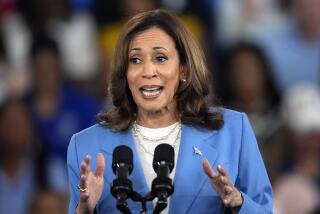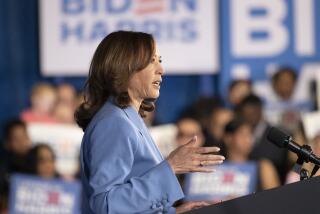Bush Counts on a Strong Economic Recovery
WASHINGTON — When all was said and done Tuesday night, President Bush’s Big Idea for fixing what ails America came down to one thing: economic recovery. And, he suggested, the hard work toward that goal is largely completed.
The president declared that recovery is already well underway, thanks mostly to $1.7 trillion in tax cuts approved during his three years in office. He made only modest new proposals for spending on jobs training and expanded tax breaks for health insurance and retirement savings, and these measures appear premised on the notion that growth will quicken.
“This economy is strong and growing stronger,” Bush declared in his nationally televised State of the Union address. “The pace of economic growth in the third quarter of 2003 was the fastest in nearly 20 years.... And jobs are on the rise.”
In largely standing on this record, the president made an immense election-year bet, one strikingly similar to the bet his father, former President Bush, made -- and lost -- in 1992.
Because if the economy does not continue surging as it has in recent quarters and if it does not start producing new jobs by the hundreds of thousands a month -- something it has yet to do -- the president could find himself under political assault by a Democratic challenger as out of touch with the concerns of ordinary Americans.
“There’s no question he’s counting on the economy to grow strongly to offset people’s clear unease about the job situation and the rest of his domestic agenda,” said Norman J. Ornstein, an analyst with the generally conservative American Enterprise Institute in Washington.
To be sure, Bush declared that more needed to be done to secure improvements already in tow, pointing to proposals designed to assuage voters’ worries about rapid economic change, the rising cost of medical care and the need for additional retirement savings.
The president proposed a $500-million “jobs for the 21st century” program that was described in White House fact sheets as two-pronged: Half the money would go to low-income middle schools and high schools to help students improve in reading and math, and the other half is targeted to community colleges for job training.
But critics said that the president has cut about $1 billion in job training funds in the last three years. And they argued that what the workers most likely to use the program needed most was an extension of federal unemployment benefits, which Bush and Congress allowed to lapse last month.
The benefits program provided unemployed workers with up to 13 weeks of compensation, and was pumping close to $1 billion a month into the economy before it began shutting down Christmas week.
Bush offered several proposals -- some new and others recycled from past years -- to help people buy health insurance. They include a refundable tax credit of up to $3,000 for low-income families with children, and an expansion of the tax-break-heavy health savings accounts that were part of the recently approved Medicare prescription drug legislation.
Under the refundable plan, families who don’t make enough money to pay taxes and therefore can’t benefit from ordinary tax breaks actually receive checks from the government to help pay for health insurance -- an arrangement that not only infuriates congressional conservatives but that many health experts say is ineffective.
“It’s not a credit; it’s someone else’s money,” Rep. Spencer Bachus (R-Ala.), said last year. “If we want to turn our tax code into a welfare system, let’s be honest with the American people that’s what we are doing.”
“The tax code is not a very effective tool for making health insurance policy,” said Jonathan Gruber, an MIT economist who has studied the issue. Gruber said that a comprehensive insurance policy such as those offered by large employers would cost a family about $10,000, so the maximum credit of $3,000 would not come close to covering the cost.
Bush’s expansion of the health savings account is complicated, but begins a process that many tax experts feared.
Until the account’s creation in the Medicare legislation, savings tax breaks came in only two flavors. Individuals got a break when they put money into a tax-favored retirement or medical savings account, or they got the break on what they earned on their contributions. The health savings accounts give both.
Even before the president’s proposal, health economists said insurance companies and benefits consultants appeared to be promoting health savings accounts heavily, making it likely that they would be heavily used.
The president made glancing mention of other savings tax breaks and suggested that he would push for partial privatization of Social Security. “Young workers should have the opportunity to build a nest egg by saving part of their Social Security taxes in a personal retirement account,” he said.
But neither Bush nor the White House would provide details of how much the president thinks workers ought to be able to save or what form the accounts would take. Analysts say that diverting any money from the Social Security system will only worsen the financial strains on the program as the baby boom generation retires.
Bush trained his biggest rhetorical guns on the issue of making his already approved tax cuts permanent, both taunting and cajoling lawmakers that unless they act they would be raising taxes on Americans.
“What Congress has given, the Congress should not take away,” he said. “For the sake of job growth, the tax cuts you passed should be permanent.”
More to Read
Get the L.A. Times Politics newsletter
Deeply reported insights into legislation, politics and policy from Sacramento, Washington and beyond. In your inbox three times per week.
You may occasionally receive promotional content from the Los Angeles Times.










